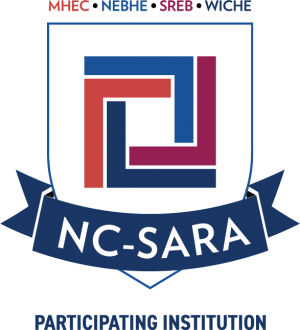We are currently experiencing technical difficulties with our campus voicemail system. We recommend using email for important communications until the voicemail system is fully restored.
This page provides information on our State Authorization and Distance Education Disclosures. It provides a variety of information regarding distance education programs, including:
- SARA and Fitchburg State University’s Approval
- Complaint Resolution process
- Information about distance education programs that lead to professional licensure and certification
- Information about International Distance Education
What is Distance Education?
Distance Education refers to online degree or certificate education programs available to students physically located in other states and territories. It also includes certain educational activities that occur outside Massachusetts, such as field placements, clinical rotations, academic internships, student teaching, and practicums.
What is State Authorization?
State Authorization refers to the requirement that institutions of higher education obtain authorization for their distance education offerings from individual states, in accordance with each state’s laws and regulations.
Why is State Authorization Information important?
As a Massachusetts institution, Fitchburg State University wants to provide students and prospective students who reside in other states the information they need to determine if Fitchburg State’s distance education offerings are authorized in that State. Providing this information to students is also mandated by state and federal laws and regulations governing State Authorization.
State Authorization Reciprocity Agreement (SARA) and Fitchburg State University Approval
The State Authorization Reciprocity Agreement (SARA) is a voluntary agreement amongst member states, territories, and districts of the United States that establishes one set of national standards and rules for distance education offerings. States that wish to become members of SARA apply to their regional education compact for approval. Once a state has been approved, institutions within that state may apply to the designated state portal entity for approval to participate in SARA. Currently, 49 states (all but California), the District of Columbia, Puerto Rico, and the U.S. Virgin Islands have joined SARA.
Fitchburg State University has been approved under the terms and provisions of SARA to operate its distance education programs in SARA-approved locations.
Complaint Resolution
Fitchburg State University makes every attempt to resolve student complaints within its academic and administrative departments. Students should first attempt to resolve any concerns by utilizing existing University procedures.
The internal Fitchburg State University complaint resolution process instructions provide information about ways that students and prospective students can report concerns and utilize University complaint procedures.
If an issue regarding distance education cannot be resolved internally, please see the process below.
For Online Students Located in SARA Member States and Territories
After you have exhausted the complaint procedures made available by Fitchburg State University, you may file a complaint with the DHE by using the SARA complaint form. The DHE SARA complaint form should be used by students who are located in SARA member states and territories. This includes all students located in SARA member states and territories to complete out-of-state learning placements, such as internships, practicums, and clinical experiences, in SARA member states and territories outside Massachusetts.
General Disclosure Statement
Professional Licensure and Certification Requirements
Professional licensure and certification requirements vary from state to state. Licensure and certification in one state do not guarantee automatic licensure in another state. Fitchburg State University offers courses and programs that may lead to professional licensure or certification in Massachusetts. Fitchburg State University has not determined that its curriculum meets State educational requirements for licensure or certification in states outside of Massachusetts.
At this time, Fitchburg State University cannot confirm if programs meet the prerequisites for professional licensure or certification outside of Massachusetts.
Out-of-state students should consult relevant associations, boards, agencies or governmental bodies within their states for licensure and/or certification information.
Please refer to the list of academic programs related to licensure and contact information of applicable state licensing boards.
International Distance Education
Degree Recognition
We advise prospective students interested in a Fitchburg State University degree to determine whether the degree will be recognized in the student’s country of residence and/or any country in which the student intends to work. Some countries may not formally recognize foreign online degrees, which may impact the ability to later enroll in other educational programs or to seek employment with a government employer or other employers requiring specific credentials. International students considering an academic program that leads to a professional license should first confirm with the appropriate professional licensing board in their country of residence and/or the country in which they intend to work whether a Fitchburg State University degree would be recognized when seeking licensure or certification.
Additional Information
Find more information about Fitchburg State University’s online programs here.
